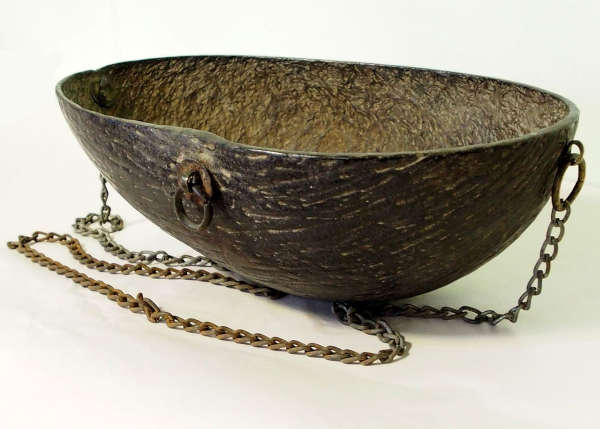FWP:
We thought we knew why gardeners planted gourds, but here's a whole new perspective on their motives: this verse might be credited with 'elegance in assigning a cause'.
But the verse is really one of what might be called word-exploration, and the crucial word is of course tūñbā . It's a very unusual and 'fresh word'; Ghalib uses it only this once in the whole divan (though it also appears in {72,8x}).
Every one of the meanings of tūñbā comes in handy in justifying the verse's rhetorical question. Such gourds are used:
=in general, to securely carry water-- or if need be, other beverages, like wine.
=to provide a kind of inner pulp from which wine can be fermented (according to Bekhud Mohani; see also Gyan Chand in {72,8x}).
=as part of the standard, emblematic traveling equipment of (religious) mendicants, in which they carry, as Platts puts it, 'water, &c.'; as wanderers, they beg for their food (and drink if necessary).
=to make rough wind instruments used by snake-charmers, jugglers, and other such street-theater performers, who use them to do tricks for small coins, almost like beggars (begging for wine?).
All these reasons imply, through a very inshāʾiyah rhetorical question, that the garden begs for wine. Why does it beg for wine? Does it itself want to drink the wine, or be watered with it? (Are its own grapes somehow part of its intoxication?) Does it want, as Bekhud Dihlavi suggests, to have us drink the wine before we go to visit it, so that we're in the proper mood of carefree rakishness? Does it want us to bring wine with us when we stroll in the garden, so that we drink toasts to the roses and fling intoxicating drops here and there? Or is the question possibly literal in the first place, and the answer might be, say, that the gardeners want to make and drink the wine themselves? As usual, we're left to enjoy the multivalent possibilities of the gourds, and to decide for ourselves what they really mean. The gardeners' action remains finally uninterpretable.
For a more extended meditation on gardens and intoxication,
see {49}. And for another verse about the sowing of gourds to obtain wine, see {72,8x}.

Nazm:
From these very gourds the mendicant's begging-bowl is made; and from the inner parts, wine. In short, the garden makes these gourds into begging-bowls, and begs, and receives wine as alms. (221)
== Nazm page 221